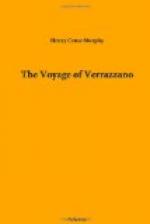This completes our purpose. The question, however, still presents itself what was the motive for this gross deception? The answer is suggested by the feet that all the evidence produced in favor of the story is traceable to Florence, the birthplace of Verrazzano. Ramusio obtained the Verazzano letter there,—the only one, he says, not astray in consequence of its unfortunate troubles. The letter of Carli, enclosing that of Verrazzano, is professedly written by a Florentine to his father in that city. The map of Hieronimo de Verrazano bears the impress of the family. The discourse of the French captain of Dieppe appears to have been sent originally to Florence, whence it was procured by Ramusio. Even the globe of Euphrosynus Ulpius, a name otherwise unknown, is represented to have been constructed for Marcellus, who had been archbishop of Florence. They are all the testimony of Florence in her own behalf. The cities of Italy which had grown in wealth and importance during the fifteenth century, by means of enterprising and valuable commerce, produced and nurtured a race of skillful seamen, among whom were the most distinguished of the first discoverers of the new world, in the persons of Columbus, Vespucci and the Cabots; but those cities contributed nothing more to the discoveries which thus were achieved, than to give these men birth and education. The glory of promoting and successfully accomplishing those results belonged to other nations, which had the wisdom and fortune to secure the services of these navigators. The cities shone, however, with the lustre reflected from having reared and instructed them to the work they so wonderfully performed. Although enjoying a common nationality, these municipales belonged to independent republics and were in a measure rivals of each other. Florence emulated Genoa. She truly boasted that Vespucci, born and raised on her soil, was the first to reach the main land and thus to have his name applied for the whole continent, “America quasi Americi terra;” while Genoa justly claimed for her son, that the discovery of all America was to be regarded as assured from the moment that Columbus landed on the little sandy island of Guanahana, on the 12th of October 1492. [Footnote: Humboldt, Examen Critique, iv, 37.] But Florence enjoys in addition the unenviable distinction of having sought to advance the pretensions of Vespucci by fictitious letters, purporting to be signed with his name.[Footnote: Varnhagen, Amerigo Vespucci, son caractere, ses scrits (meme les moins authentiques) &c., p. 67, et seq. (Lima, 1865).] That this spirit of civic pride in that same community may have actuated the fabrication of the Verrazzano letter is not improbable; but in justice to the memory of Verrazzano it must be added, there is no reason to believe that he was in any way accessory to the imposture.




